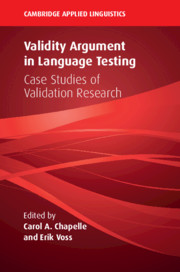Refine search
Actions for selected content:
3 results
13 - Validation Research and Its Limits
- from Part IV - Conclusion
-
-
- Book:
- Validity Argument in Language Testing
- Published online:
- 14 January 2021
- Print publication:
- 21 January 2021, pp 325-344
-
- Chapter
- Export citation
1 - Introduction to Validity Argument in Language Testing and Assessment
-
-
- Book:
- Validity Argument in Language Testing
- Published online:
- 14 January 2021
- Print publication:
- 21 January 2021, pp 1-16
-
- Chapter
- Export citation

Validity Argument in Language Testing
- Case Studies of Validation Research
-
- Published online:
- 14 January 2021
- Print publication:
- 21 January 2021
